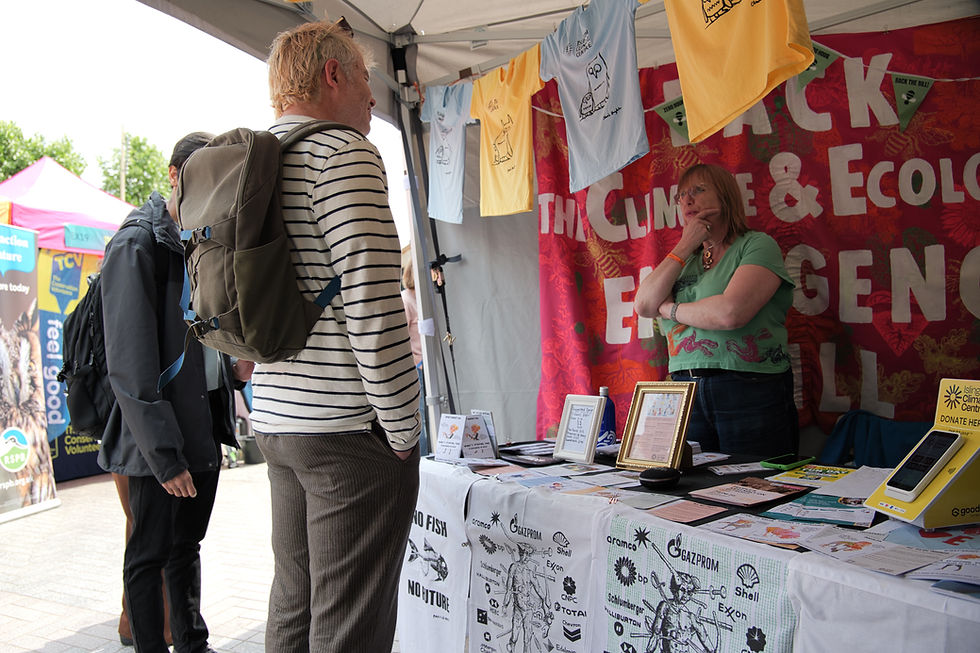Can UK events survive the extreme heat?
- Bel Jacobs

- Jun 24, 2024
- 4 min read
Updated: Jul 5, 2024
On 23 June, yellow heat health alerts were put in place for most of England, meaning that daytime temperatures could reach 30C (86F) and that weather conditions could pose a risk to those who are particularly vulnerable. Meanwhile, temperatures at this year's hajj, the annual pilgrimage to Mecca, and one of the five pillars of Islam, have claimed at least 1,300 lives.
In June 2024, the Islington Climate partnered with Shade the UK to host a People's Assembly on Heat and Shade, where citizens' concerns about higher temperatures in the city were voiced and addressed.

England vs Denmark. There is growing concern that rising temperatures might derail some of our favourite public events, including concerts, festivals, and sports.
The summer of 2022 was one to remember in the UK. There were an estimated 4,507 heat-related deaths in England alone, with the hottest day ever recorded in July, when temperatures exceeded 40 degrees.
The implications for conditions like this are widespread; one of those are the impacts of heatwaves on some of the nation's favourite public event such as festivals, concerts and sports.
Britain's 10 warmest years on record have all occurred this century, according to the Met Office national forecaster and, while it may feel difficult to call to mind while looking out at a cooler than average June this year, it is wise to prepare.
When temperatures hits In 40ºC and over in the Brazilian city of Rio de Janeiro last November, tens of thousands of Taylor Swift fans, gathering to watch the star perform as part of her latest Eras Tour, were caught in stifling conditions in the stadium.
Organisers were ill-prepared for the temperatures, quickly running out of bottled water to hand to the crowds. Over 1,000 people fainted as a direct result of the heat and overcrowding and one young fan, 23-year-old Ana Clara Benevides Machado, tragically lost her life after she fell ill just before the show. Cause of death was given as heat-related cardiorespiratory arrest; according to Rio’s Forensic Medical Institute.
"Specifically, concertgoers complained of being unable to adequately hydrate themselves once within the venue, with organisers strictly prohibiting fans from bringing in their own bottles of water, whilst failing to provide sufficient quantities to the audience as the heatwave unfolded," writes Oliver Longstaff, in an article for Shade the UK.
What the Swift concert in Rio demonstrates is that this "cannot be taken as an isolated incident," emphasises Longstaff. "In just the past year, a number of large outdoor events have been either cancelled or postponed due to extreme heat, with thousands suffering heat-related illness as a result. From Ed Sheeran’s concert in Pittsburgh, to the hospitalisations from the Sydney Marathon, to a South Korean scout jamboree, public events are having to respond to heat-related emergencies.
A heating planet
According to a recent survey in the Guardian, hundreds of the world’s leading climate scientists expect global temperatures to rise to at least 2.5C (4.5F) above preindustrial levels this century, blasting past internationally agreed targets and causing catastrophic consequences for humanity and the planet. And it's not simply heat: "Compounding this, a recent report from the American Meteorological Society (AMS) revealed that the warming of our climate is inextricably linked to the rise in the frequency and severity of extreme weather events, heatwaves included," writes Longstaff.
"It appears evident then that heat-related disasters at such events as the concert in Rio will only grow in frequency and severity, should we collectively be unable to adapt their organisation and planning procedures to ensure resilience in the face of extreme weather," he continues, citing Milad Haghani, senior lecturer in public safety and disaster risk at UNSW Sydney, who mapped a growing trend with regards to freak weather events and music festival cancellations.
"From 2022-23, over 22 music festivals across the country were either cancelled or impacted due to extreme weather, compared to a mere 10 weather-related interruptions from 2013-19," reflects Longstaff. Of particular concern this year are the Paris 2024 Olympics, taking place between July and August with a recent study in Nature, detailing how the French capital now faces the risk of record-breaking heat in the coming months.
Preparation is key. "Following the concert tragedy in Rio last year, event organisers were quick to implement an action plan to beat the heat as temperatures continued to rise," says Longstaff. "And whilst these measures do support people to keep cool - including lifting bans on entry with water bottles, distributing more bottled water, boosting staff numbers, and providing further on-site medical care - we worry that it might take further tragedies, possibly even a disaster, to motivate further industry-wide action."
Beating the heat
Shade the UK recognise there are multiple warning signs for threats to some of our favourite events here in the UK and offers research on further guidance on how partner organisations’ sustainability action plans should address hot weather and heatwaves.
"We encourage venues and event organisers to ensure ample shaded areas within and around their events, to allow attendees respite from the heat if they need it," says Longstaff. "For example, provide pavilions, gazebos, shade sails, umbrellas for outdoor seating, and incorporate trees and plants wherever possible. Furthermore, any major walkways or congregation areas should ideally be shaded from the sun, to keep large crowds out of direct sunlight and enable ease of movement.
For the full set of recommendations, please visit the original article.








Comments